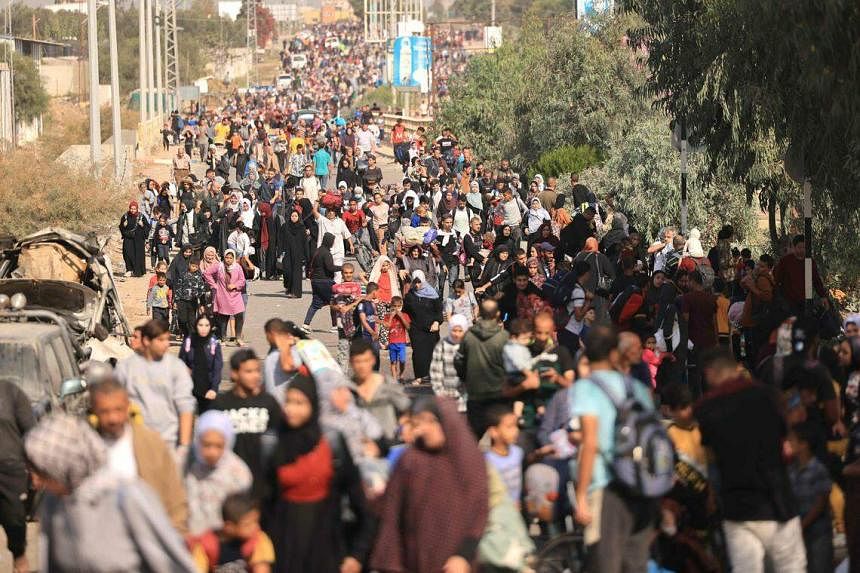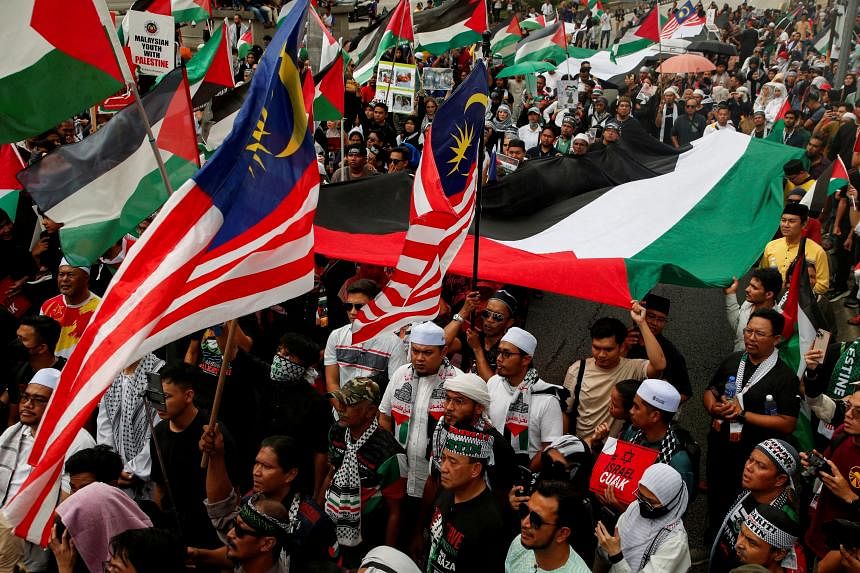KUALA LUMPUR/JAKARTA/WASHINGTON - The prolonged conflict in Gaza is deepening antipathy in South-east Asia, especially among its Muslim populations, towards the United States over Washington’s unflinching support for Israel.
This raises questions as to whether governments in the region, particularly in Malaysia and Indonesia which have Muslim majorities, will be under pressure to play to the gallery and make a show of slowing down efforts to forge closer ties with the US, said analysts.
While countries in the region court stronger economic ties with China, they have also sought closer relations with the US to balance the Asian powerhouse’s influence in the region, particularly at a time when Beijing has been increasingly assertive in its disputes in the South China Sea with several Asean nations.
However, the US “has never been an unequivocally welcomed power in our region”, said Professor Joseph Liow, dean of the College of Humanities, Arts and Social Sciences at Nanyang Technological University.
This is a hangover of things that happened 20 years ago, he said, pointing to America’s war on Afghanistan and Iraq in the aftermath of the Sept 11 terrorist attacks in the US in 2001.
This is “very fresh in the minds of many Malaysians and Indonesians, and I think that script is going to play out again, and that is going to create difficulties for the leaders of these countries”, he said at a lecture on Nov 1.
What is more, “the domestic political configuration today is far more brutal than it was 20 years ago, so that will be particularly tricky”, he added.
Indeed, in Malaysia, Prime Minister Anwar Ibrahim, who in his first year in office is battling to reverse waning support from the Malay Muslim majority, is finding he has had to up the rhetoric on the Gaza conflict.
“American troops are all over the Middle East... giving easy passage to Israel. This has reached the level of insanity to allow people to be butchered. This is the height of barbarism,” he said at an Oct 24 rally in Kuala Lumpur in support of Palestinians.
Still, so far, it has been just talk.
While taking a hardline stance, the Malaysian government has also sought to explain to foreign governments that this is due to pressure from the Malay Muslim nationalist opposition, official sources told The Straits Times.
“‘Cut me some slack’ is the gist of it,” a top diplomat said.
While Jakarta also stands with the Palestinians – and like Kuala Lumpur, points to Israeli occupation of Palestinian territories as the root cause of the conflict – it has used less confrontational language. Indonesian President Joko Widodo has called for a resolution along “United Nations parameters”.
There are no significant policy changes so far, as the conflict in Gaza enters its second month and the Palestinian death toll now reaches well above 10,000, since Hamas’ unprecedented Oct 7 attack on Israel, killing 1,400 Israelis, mostly civilians, and taking more than 200 hostages.
This lack of government action has led to consumers in Malaysia and Indonesia organising boycotts against companies and products, mostly of American origins, deemed – sometimes mistakenly – to have ties to Israel.
There has been strong organic support for boycotts in both countries, with some Starbucks and McDonald’s outlets around Kuala Lumpur and Jakarta seeing a marked drop in footfall. There have even been protests outside American restaurant chains.

But the Indonesian government has distanced itself from these initiatives.
“Our priority has always been carrying out policies that support the productivity and competitiveness of our industry,” the Industry Ministry’s most senior bureaucrat, secretary-general Putu Juli Ardika, said on Nov 2, adding that the government is neither in support of nor in opposition to such boycotts.
However, both Datuk Seri Anwar and Mr Widodo are expected to raise the Gaza issue at the Asia-Pacific Economic Cooperation Economic Leaders’ Week 2023 taking place in the US from Saturday.
Mr Widodo, who has secured a bilateral meeting with US President Joe Biden, is widely expected to push his counterpart to secure a ceasefire between Israel and Hamas.
While the Biden administration remains firmly supportive of Israel, there are divisions within Congress and in the State Department over that position. Some State Department staff have critiqued the administration’s handling of the war in an internal dissent memo, with a Politico report stating that they argued, among other things, that the US should be willing to publicly criticise Israel.
This comes as pressure grows in Muslim societies, within and beyond the US, to rein in Israel.
Dr Prashanth Parameswaran, a fellow at the Wilson Centre, a Washington think-tank – and founder of the Asean Wonk newsletter – told The Straits Times that “if the Biden administration doesn’t carefully thread the needle between its support for Israel and addressing the Palestinian plight, Washington risks losing the street in Muslim South-east Asia which could, in turn, complicate public aspects of its cooperation with governments”.
Despite differences over the war, strategically, the US’ relations with countries in South-east Asia are unlikely to suffer long-term derailment, said the Centre for Strategic and International Studies’ South-east Asia programme director Gregory Poling.
“It’s inevitable that this will create some backlash and resentment towards the US, particularly in Malaysia and in parts of Indonesia,” he said. “But what’s not clear yet is how deep and long-lasting that will be.
“It’s pretty clear that elites in both countries, but especially in Indonesia, want to maintain positive relations with the US, while they have to maintain a balance on the Israel-Palestine question.”
Former transport minister and Malaysian Chinese Association president Ong Tee Keat, who now heads the Belt and Road Initiative Caucus for Asia-Pacific, told ST that “any political leader will be aware of sentiment on the ground, but foreign policy changes are a matter of a variety of factors, although it can become unpredictable when politics comes into it”.
What some fear is that the refusal of Muslim leaders in the region to condemn Hamas could spur militancy, with hundreds having previously joined the Islamic State in Iraq and Syria, and Syria’s uprising against the Bashar al-Assad regime.
Professor Zachary Abuza, an expert on South-east Asian security at the National War College in Washington, warned of a “revitalisation of terror networks, renewed terror attacks, radicalisation and fund-raising for militant groups” as the war in Gaza continues, serving as “a catalyst for... disparate jihadist groups in South-east Asia that are seeking both a cause and charismatic leader to rally around”.
In part, the Hamas International Financing Prevention Bill to impose sanctions with respect to foreign support for Hamas and the Palestinian Islamic Jihad, which was passed by the House of Representatives, is the US’ attempt to stifle such a development.
Although it still needs to be given the green light by the Senate as well as President Biden, concerns are already growing in Malaysia, where Mr Anwar has insisted that such unilateral sanctions will not be recognised.
Nonetheless, he acknowledged that it could impact trade and, more importantly, investment ties with the US, which contributed more than half of the RM75 billion (S$21.7 billion) net foreign direct investment inflow in 2022.
Ms Ariel Tan, a senior fellow at the S. Rajaratnam School of International Studies and coordinator of the Malaysia programme, told ST, however, that even if the Bill becomes law, the impact would depend on what constitutes “support”, for what activities, what specific US assistance to Malaysia would be at stake, and if the US would seek a waiver for Malaysia due to considerations of national security interests.
“Malaysia, like many Muslim-majority countries, is a significant source of private fund-raising for humanitarian and development purposes in the Palestinian territories. It is almost impossible to account for all the sources and destinations of these funds. While PM Anwar is unlikely to withdraw his political and moral support for Hamas for now, his government would have to consider how it relates to Hamas, and provide support for the Palestinians under changed circumstances in Gaza as well as US law,” she said.

Former foreign minister Saifuddin Abdullah, who is now an opposition lawmaker, has openly said Malaysia hosts a cultural society organisation belonging to Hamas and “we are not apologetic about it”.
Mr Anwar’s preparedness to face the music might also be down to warming ties with China, with two visits in six months yielding hundreds of billions in deals.
But what is clear is his need to keep Malaysia’s distance from the US, at least publicly, to assuage public sentiments at a time when he needs to keep Muslim-majority voters onside in order to see out his first term and perhaps win a second.
Datuk Seri Saifuddin told ST: “Anwar seems to have to do extra work to dispel the image that he is pro-US. But in foreign policy, we have to be very measured in our choice of words and language. Since he became prime minister, he seems to be very loose.”
- Additional reporting by Wahyudi Soeriaatmadja

